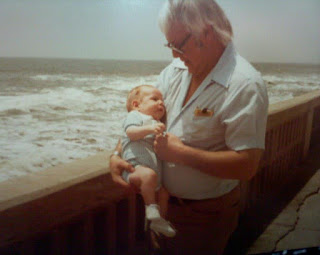
My dad loved the aircraft museum. He was a quiet man, but he grinned like a kid when he'd look at the Hellcat in the hangar. I was partial to the F4J-Phantom. I think his love for the aircraft came from his Air Force days. Before he was a civillian pathologist, he was in the AF during the 50's and 60's. He was actually trained to fly a few larger aircraft, although his primary job was to practice medicine. Sometimes when I go to Tennessee, I go to the garage and I find his flight helmet. I pick it up. I wonder. He really loved the Air Force.

And of course I find his stethoscope. An old blood pressure cuff. Even a black doctor's bag. I brush the dust off of these things, and I talk to my dad.
"Why didn't you tell me this world was a mad house?"
OR
"How did you survive the death of your first marriage?"
OR
"I'm doing the best I can. I really am."
OR
"Thank you for being a kind, wise, loving father, and not a jerk."
BUT MOSTLY
"I miss you."
If you have a loved one who's died, it's likely you talk to them too. I don't suppose I'll ever stop.
These days I am trying to recover something from the past. I've always been interested in the past. Anyway, I've decided that the symbol of this "recovery act" is my own body. I'm trying to eat well. Trying to exercise. I've lost thirty-five pounds so far. This means I weigh about 268 pounds. In high school, when I played football and wrestled, I weighed in the 190-205 range. Dad got sick in April of 1996. Died a few months later. I kind of just gave up after that. But now I've decided a change in policy is in order.
I know that getting to 200lbs again won't bring my dad back. But this process, for me, is about bringing something of myself back. It is about a journey to a place better than Charleston... or ANY city. Walt Whitman wrote a poem entitled, "Passage to India." In this poem he celebrates the great technological accomplishments of humankind. Laying down telegraph wire across an ocean... circumnavigating the globe... You'll remember that centuries ago, Europeans were obsessed with a shortcut to India. Finding a "passage to India" was a symbol for progress, and indeed, Whitman heaped praise upon the advances made over the centuries. But he laid a bold charge down for the reader at the end. We are charged to take "passage to MORE than India." Despite the technological advances, Whitman felt that the last great frontier was spiritual.
I do hope to return to Charleston again someday. I hope to return with people I love. But my deepest hope is to passage to more to India... to go more deeply into my own heart... more deeply into the heart of God. I imagine that I bring my dad with me in this journey, and all the people I love. With such good company, I know that I will not fail. And who knows what I might find?
